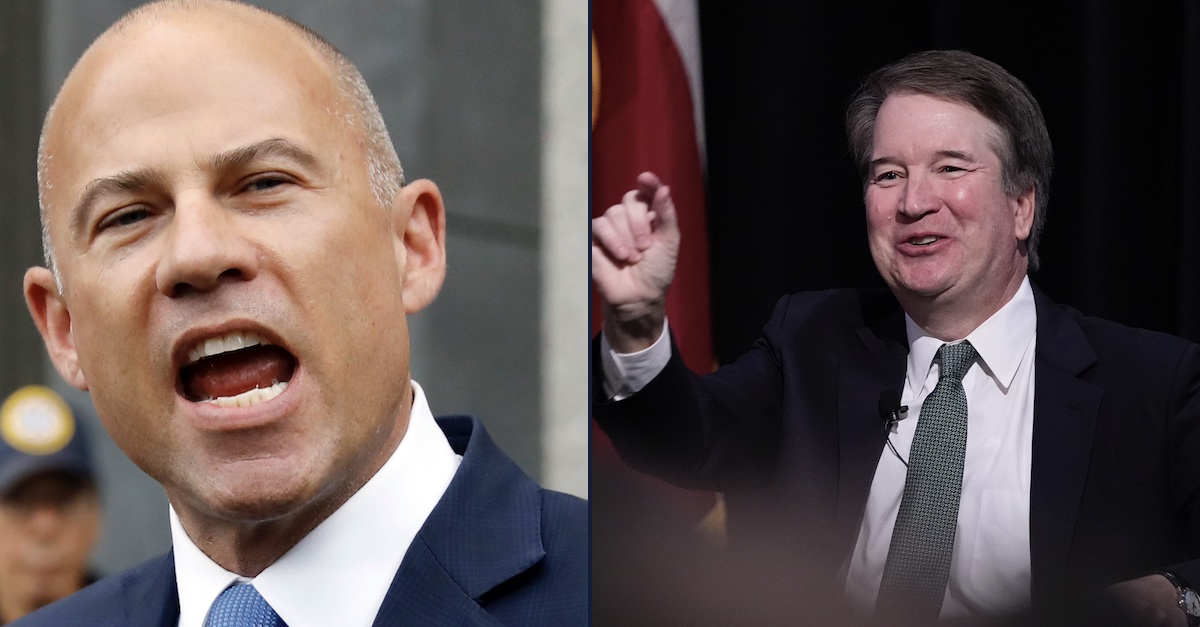
Michael Avenatti (left) makes a statement to the press as he leaves federal court in New York, July 23, 2019. A federal appeals court on Wednesday, Aug. 30, 2023, upheld Avenatti’s conviction for plotting to extort up to $25-million from shoe giant Nike – one of several legal messes that have landed him behind bars. (AP Photo/Richard Drew, File), Justice Brett Kavanaugh (right)speaks during judicial conference, Friday, May 10, 2024, in Austin, Texas. (AP Photo/Eric Gay)
The U.S. Supreme Court was unmoved Tuesday by disgraced attorney and incarcerated fraudster Michael Avenatti’s attempt to overturn his convictions for extorting Nike, but one of the justices noticeably declined to participate.
In an orders list, the high court denied Avenatti’s petition for a writ of certiorari without explaining why, only noting that Justice Brett Kavanaugh “took no part in the consideration or decision of this petition.”
The court didn’t offer an explanation for Kavanaugh’s non-participation either, but a trip down memory lane shows there’s at least one obvious possibility: Avenatti once represented Julie Swetnick, a woman who publicly accused the then Supreme Court nominee of “gang rape.”
When Swetnick went on NBC with her story, she said, “I cannot specifically say that [Kavanaugh] was one of the ones who assaulted me.”
Still, she described Kavanaugh as a “very aggressive — very sloppy drunk, very mean drunk” who, at parties in the 1980s, would “go up to girls and paw on them, try to, you know, get a little too handsy, touching them in private parts.”
Just days before that interview, an ex-boyfriend of Swetnick’s said that he once got a restraining order against her.
“Right after I broke up with her, she was threatening my family, threatening my wife and threatening to do harm to my baby at that time,” the man told Politico in 2018, adding, “She’s not credible at all.”
Criminal referrals for false statements followed.
In his February petition, Avenatti insisted that the lower courts got his honest services fraud and extortion convictions wrong.
“Petitioner, an attorney representing a plaintiff with potential contract and tort claims, was convicted of honest services fraud, in violation of 18 U.S.C. §§ 1343 and 1346, and extortion offenses, in violation of 18 U.S.C. §§ 875(d) and 1951, based on demands that he made during settlement negotiations with a defendant,” the petition said, asking the court to find that the fraud statute was unconstitutionally vague as applied to him.
He asked the court to answer two questions:
1. Is § 1346 void for vagueness?
2. Can civil litigation conduct―in particular, an attorney’s settlement demand―support federal criminal extortion liability?
The high court answered neither of these two questions, even though Avenatti asserted that Justices Neil Gorsuch and Clarence Thomas should have warmed to his position given the overturning of the fraud conviction of Joseph Percoco, a former top aide to ex-New York Gov. Andrew Cuomo (D).
“As Justice Gorsuch, joined by Justice Thomas, recently observed, despite this Court’s many efforts to cabin and clarify § 1346’s scope, ‘[t]o this day, no one knows what ‘honest-services fraud’ encompasses,” the petition said. “And the Constitution’s promise of due process does not tolerate that kind of uncertainty in our laws―especially when criminal sanctions loom.’ Percoco v. United States, 143 S. Ct. 1130, 1140 (2023) (concurring op.).”
Bureau of Prisons records reviewed by Law&Crime show that inmate Avenatti, now 53, is on track to be let out of prison in August 2035.
Have a tip we should know? [email protected]









